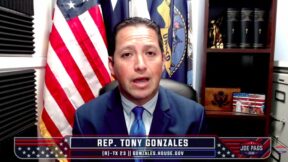Peter Doocy and Karine Jean-Pierre Spar Over Biden Adviser’s New Definition of a Recession: ‘What Changed?’
Peter Doocy and White House Press Secretary Karine Jean-Pierre sparred Wednesday after the former pointed out that White House economic adviser Brian Deese updated his definition of a recession.
One technical definition of an economic recession has been widely accepted for decades as two consecutive quarters of negative economic growth. Democrats have been accused by conservatives and others in recent days of attempting to change that definition.
The Biden administration has argued, in anticipating of a report likely two show two straight quarters of GDP declines, that a “technical recession” does not make a formal one. Per Bloomberg:
Biden’s aides, including Treasury Secretary Janet Yellen, have fanned out in recent days in preparation for Thursday’s quarterly gross domestic product data, explaining that the formal definition of a recession is complex and runs deeper than simply two quarters of negative growth.
The Washington Post reported how a formal recession is determined on Monday in a piece authored by Aaron Blake, who wrote:
The first thing to note is that two straight quarters of negative GDP growth isn’t determinative. The official determination is up to the NBER, a nonpartisan, private organization that utilizes other factors in making such calls.
Deese addressed the issue of an economic downturn Tuesday at the White House.
“I just want to make a final note on the definition of recession, which has been an issue that I know many of you have reported on,” Deese said.
“As [Treasury Secretary Janet Yellen] said on Sunday, two negative quarters of GDP growth is not the technical definition of recession. It’s not the definition that economists have traditionally relied on,” Deese added.
During Jean-Pierre’s daily briefing Wednesday, Doocy sparred with her over Deese’s comments, pointing out that he previously relied on the technical definition of a recession — not the formal one.
DOOCY: Why is it that White House officials are trying to redefine recession?
JEAN-PIERRE: No, we’re not redefining recession.
DOOCY: If we all understand recession to be two consecutive quarters of negative GDP growth, in a row, and then you have White House officials come up here to say, no, no no, that’s not what a recession is. It’s something else. How is that not redefining recession?
JEAN-PIERRE: Because that is not the definition. That is not the definition.
DOOCY: Brian Deese said in 2008, “Of course economists have a technical definition… of recession, which is two consecutive quarters of negative growth.” And then yesterday he said two negative quarters of GDP growth is not the technical definition of of a recession. What changed?
JEAN-PIERRE: It is not. It is not.
[crosstalk]
JEAN-PIERRE: I can speak to what he said yesterday in front of all of you which is the last thing that you just repeated. There are many factors, there are many…. economic factors and indicators to consider, and I will say the textbook definition of a recession is not, is not two negative quarters of GDP.
In March 2008, as Hillary Clinton’s economic policy adviser, Deese commented on the definition of a recession amid the early months of the Great Recession.
“What Senator Clinton has said is that of course economists have a technical definition of recession, which is two consecutive quarters of negative growth,” Deese said. “And what she’s been more focused on is how the economy is impacting typical families.”
The comment was unearthed Wednesday morning by the Republican National Committee, and was widely circulated.
In 2015, after then-candidate Donald Trump wrongly implied former President Barack Obama was dragging the U.S. toward a recession following a negative quarter, the Post fact-checked him.
The Post‘s definition of a recession at that point emphasized that two negative quarters is a “standard indicator” for a recession:
The GDP did shrink in first quarter 2015 by a 0.7 percent annual rate. But Trump is simply wrong when he asserts “it’s never below zero.” After all, two negative quarters in a row is a standard indicator for an economic recession.
Economists are bracing for the potential that Thursday’s second quarter GDP numbers will show the economy contracted for a second straight quarter.
New: The Mediaite One-Sheet "Newsletter of Newsletters"
Your daily summary and analysis of what the many, many media newsletters are saying and reporting. Subscribe now!






Comments
↓ Scroll down for comments ↓